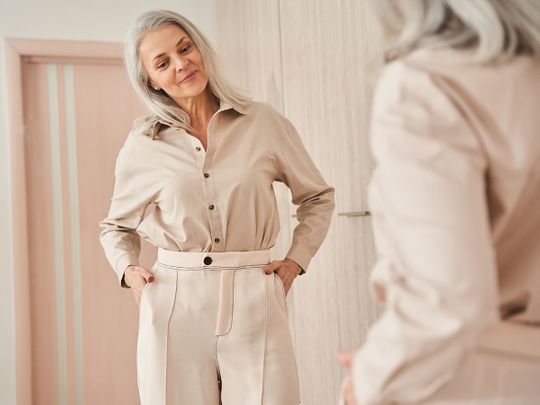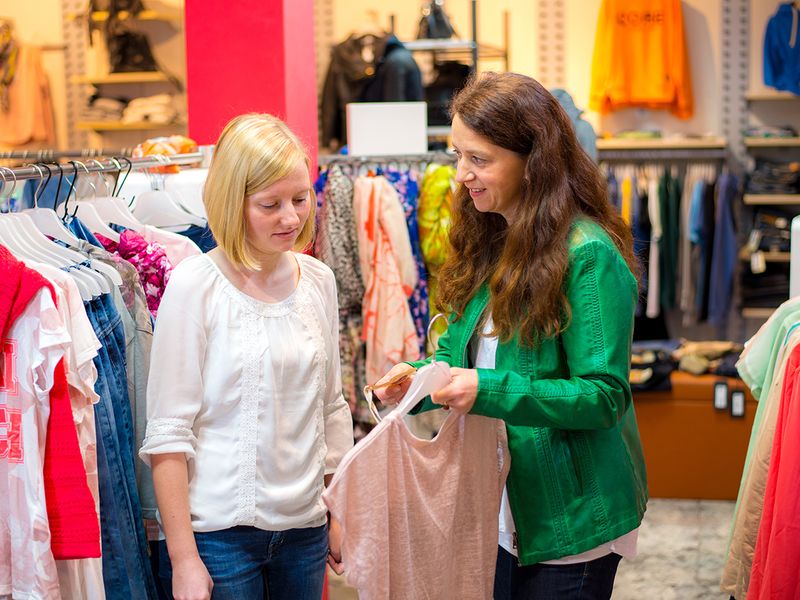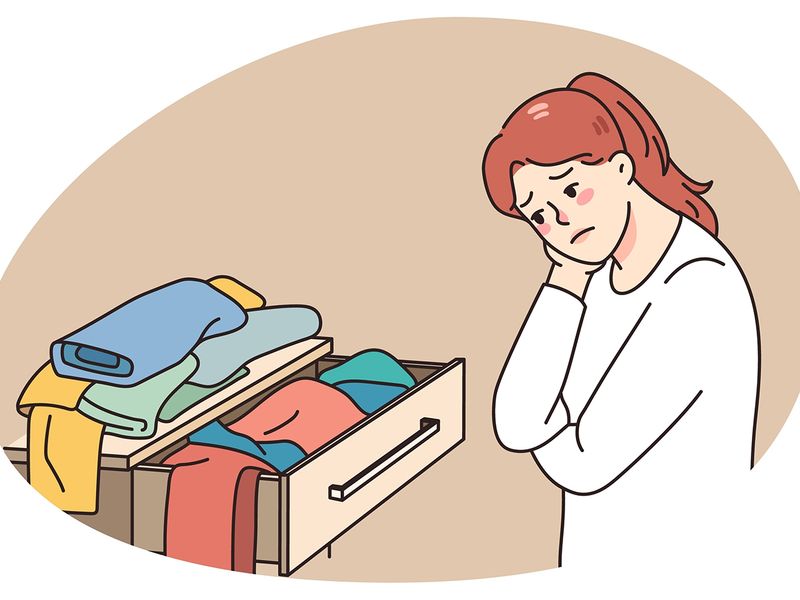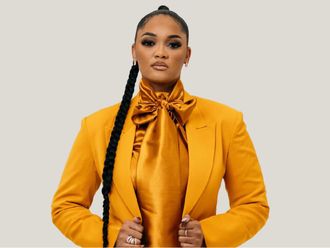
Dress your age.
Thirty-five-year-old Sophia Hill, a British part-time receptionist and home tutor, was breezing through a popular clothing store in Dubai, listening to a mother and daughter having a fierce discussion in whispers. As she understood, the mother was desperate to find some “sensible” clothes for her thirty-three-year-old daughter, who had no interest in this shopping expedition. As Hill says, “The mother didn’t like anything her daughter picked out. Her daughter was either too ‘young’ or ‘too old’ to wear some clothes.” Elaborating on what these clothes might be, Hill says that she noticed the daughter was keen on a long denim skirt. But her mother glared and said that she was far beyond the age of wearing such “trendy” clothes.
The daughter picked out a pair of grey pants and a matching jacket. She didn’t win any favour here either; her mother groaned that only “old people in their sixties” wear things like that. The visit bore no fruit; the daughter finally stormed out of the store, and went to buy ice-cream for herself instead.
Hill admits she nervously checked her own outfit in worry: What would this mother think of this long cotton dress and sleeveless jacket that she was wearing?
Hill tells me rather wearily, “I miss being in my late teens and early twenties. There was no one to tell me, what’s too ‘young’ for me. I don’t know who decided how your age decides your clothes, but here we are.” Listening to her, I automatically looked at my own jeans and anime t-shirt. By these standards, I might just be too old to wear this.
Are we in an age where age really decides our clothes and fashion sense? Or, is it us who decide it?
‘Fashion is subjective’

Some people in their late fifties might feel awkward about wearing a dress that a person in their twenties wouldn’t think twice about. Yet, there would be others in the same age bracket who would buy it without qualms.
Fashion is subjective and can vary across cultures and generations, explains Fatima Al Shirawi, a Dubai-based colour psychologist. “In many societies, there are many trends or styles that are commonly associated with specific age groups,” she says. However, she emphasises that these rules are not set in stone; they are actually unwritten social norms and expectations. “Feeling uncomfortable about wearing certain clothes can stem from various factors, including societal pressures and fear of judgment from others. As people age, they may feel the need to conform to certain standards and expectations regarding age-appropriate clothing,” she says.

Feeling uncomfortable about wearing certain clothes can stem from various factors, including societal pressures and fear of judgment from others. As people age, they may feel the need to conform to certain standards and expectations regarding age-appropriate clothing
For instance, as Pallavi Bushan, an Abu Dhabi homemaker shares, “My mother enjoys relaxing at home in a t-shirt and pyjamas. But she has actually faced judgement from our close relatives and family members when they came home, who told her off for ‘not dressing her age’. Earlier, she used to get rather upset at these comments, but now she just wears what she wants and ignores the comments.”
Such judgement can normally create a fear of being perceived as trying too hard to look young or not dressing appropriately for their age, says Shirawi. “Unfortunately, society often judges older people for dressing in a way that is perceived as ‘young’ because it challenges traditional notions and expectations surrounding aging,” she explains. “Some people may subscribe to outdated stereotypes that dictate how older individuals should dress, which can lead to criticism or judgment, when these stereotypes are not adhered to. It's important to remember that fashion is a form of self-expression, and people should be free to wear what makes them feel confident and comfortable, regardless of their age,” adds Shirawi.
‘The older you are, the more conservative you should appear’

Bhushan, who is in her early forties, has always had ‘anxiety’ surrounding her clothes and outfits. “I used to be so conscious, before choosing or buying clothes. I kept thinking, does this really suit my age? Can I really wear that shirt, which looks so good on a person in their twenties? The truth is that I’ve encountered so many judgmental people in my life, that I’ve internalised their comments. Unlike my mother, I can’t shake it off. So it’s fixed in my head now, that your age decides your clothes. And I catch myself often judging others in their late fifties for wearing something like a dress for a party. I won’t deny that it’s my first reaction to judge someone for outfits that I deem age-appropriate,” she adds.
In society, age often carries with it certain expectations, for example the older you are the more conservative you should appear, says Bisi Laniyan, a clinical psychologist at Sage Clinics, Dubai. “Society's fascination with age-appropriate clothing can perpetuate stereotypes and reinforce the idea that one's worth is tied to their appearance. When someone, for example, an older adult, defies these norms, they may experience discrimination, judgment, criticism, or even exclusion from their peer group,” she says.

Society's fascination with age-appropriate clothing can perpetuate stereotypes and reinforce the idea that one's worth is tied to their appearance. When someone, for example, an older adult, defies these norms, they may experience discrimination, judgment, criticism, or even exclusion from their peer group
For instance, in many cases, a woman in her late forties dressed in an outfit that an eighteen-year-old girl would wear, would instantly invite judgement, and even mockery. The first response would be that “she’s trying too hard to look young”. Yet, if she wore an outfit that is deemed “age-appropriate” by society, there would be no question or remarks.
“Looking older, looking younger…”
Somehow, certain categories of clothes have become fixed for certain ages. It also depends on how a person looks, and what society deems as “looking young or old”.
Tamara Hallett, an American Dubai-based public relations consultant adds to this and says, “There’s so much superficiality and hypocrisy, sometimes. Everything comes down to the looks. If a woman in her late forties looks ‘young and beautiful’, then she won’t be judged for wearing ‘young outfits’. But if a person in the same age bracket wears the same outfit but ‘looks older’, or what others perceive her to be, she is judged,” says Hallett. “There are such fixed and rigid perceptions of beauty, and youth, which is tied to a person’s clothes. And then we impose these views on someone else, who is just happy and content with whatever they wear, at any age. If only, we let people be.”
How societal influence on fashion impacts our well-being

Think of all the advertisements of clothing brands that you see. Think of everything that you consume on social media, which include reels waxing eloquent on fashion trends, what’s right and what’s not.
Shirawi and Laniyan agree that fashion is a societal construct. Explaining how society controls in deciding what’s considered fashionable and acceptable, Shirawi says, “Society defines what we wear through various means, including media, advertising, peer pressure, and cultural norms. Fashion advertisements, fashion shows, magazines, and social media platforms heavily influence our understanding of the latest trends and what is considered fashionable.”
“Fashion and trends are largely driven by society's ever-changing perceptions and values, meaning what we consider fashionable or appropriate today may differ significantly in a few years’ time,” adds Laniyan.
The pressure from our friends, combined with societal expectations play a role in how we dress as people seek validation and acceptance from their social circles. “On one hand, conforming to societal standards can provide a sense of belonging and acceptance,” says Shirawi. On the other hand, it leads to feelings of inadequacy or self-consciousness, if a person doesn’t meet society’s expectations. While fashion is a strong tool for self-confidence and self-expression, it is essential to prioritise individual comfort and personal style over societal expectations, she explains. “Ultimately, well-being comes from feeling authentically oneself and finding a personal sense of style that brings joy and confidence,” she says.
Elaborating more on this point, Laniyan explains that the need to belong is a fundamental human need. According to social identity theory, we categorise ourselves and others into groups based on shared characteristics, she says. “In the fashion world, belonging is a powerful motivator that influences clothing choices to demonstrate membership of specific groups or subcultures. Dressing in ‘deviant’ ways can result in disapproval or even rejection, undermining our sense of belonging. This social exclusion or rejection can lead to feelings of isolation, low self-esteem, and emotional distress,” says Laniyan.
Dress up to feel good, doesn’t matter how old you are

Our clothes can provide an insight into how we feel. The more we try to curb someone’s expression by attaching an ageist implication to it, we are affecting their well-being.
“As a psychologist, when it comes to our wellbeing, I've observed that physical appearance can provide insight into someone's mental state,” says Laniyan. “For instance, a noticeable shift in grooming habits, such as a dishevelled appearance, can often be indicative signs of underlying mental health issues, such as depression. For example, when working with individuals who neglect self-care and present themselves with a low mood, I would often suggest putting on clothes they like that makes them feel special,” she explains.
And so, when feeling low, dressing up becomes an act of self-care. It’s a way to demonstrate self-worth, she says. “It's not just about the clothes, fashion isn't just about looking good; it's about feeling good, expressing our identity, and positively nurturing our mental health,” explains Laniyan. So, if someone in their late fifties chooses to wear an outfit that you think is fit for a younger person, let them wear it. If it makes them feel good, so be it. Dubai-based stylist Nidhi Singh also has some advice, as she says it's all about developing your personal style as you grow older. "Yes dress your age has cultural connotations to it, but now many people dress to express themselves, rather than what they should be wearing. You have to keep updating your style, which will evolve with age, life and experiences. Age is a number, so invest in a personal signature style that evolves with your personality," she says.
“Psychological research highlights the importance of our outward appearance including the clothes we wear as a significant part of personal identity,” says Laniyan. “As society, we should push for inclusivity, promote substantiality, and embrace self-expression through our personal clothing choices,” she says.









